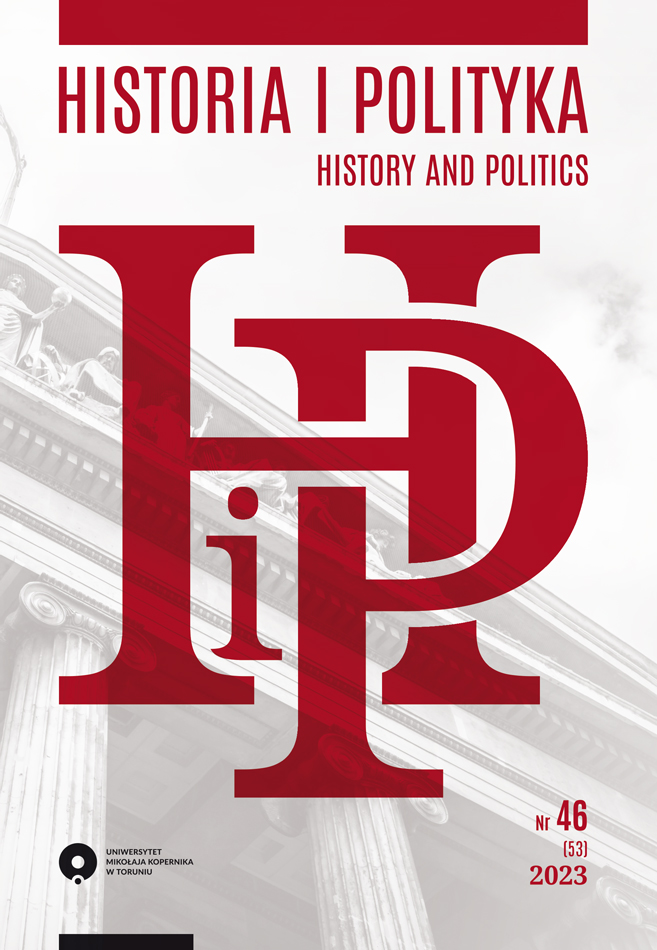Foreign Policy Issues of the Republic of Turkey and the United States in the Period after the End of the Cold War until the 2020
DOI:
https://doi.org/10.12775/HiP.2023.034Słowa kluczowe
Turkey, USA, Armenia, Russia, Israel, Iran, foreign policyAbstrakt
At the beginning of the 21st century, in 2002, a new political era began with the arrival of Recep Tayyip Erdogan and the Islam-oriented Justice and Development Party (AKP) at the head of the Republic of Turkey, which was gradually followed by changes in both foreign and domestic policy of the country.
The main ideologist of modern Turkey’s foreign policy is one of the founders of the Justice and Development Party and Erdogan’s ally, former Foreign Minister and Prime Minister Professor Ahmet Davutoglu, who outlined the strategic priorities of Turkey’s foreign policy in his pioneering work Strategic Depth. In his doctrine, Ahmet Davutoglu argues that Turkey has “strategic depth” that allows it to pursue an independent foreign policy and claims to be the leading state in the region.
As we know, the Republic of Turkey is located at the crossroads of Europe and Asia. According to the doctrine, precisely because of its geographical position and historical ties, it has a desire to influence all these regions (the Middle East, the Balkans, the Caucasus, Central Asia, the Mediterranean, the Persian Gulf, and the Black Sea), what is considered the core of neo-Ottoman ideology.
Neo-Ottomanism implies a shift of the Turkish political vector from West to East. Since the beginning of the 21st century, neo-Ottomanism as an ideology has become a force responsible for the shape of political life of Turkey. According to the ideology of neo-Ottomanism, the Republic of Turkey must get rid of the subordination of the United States, which will allow it to put itself on a par with such states as Britain, France, Russia, and China.
Neo-Ottomanism is the main ideological direction of the new foreign policy of the Republic of Turkey. One of the arguments used by Erdogan and his party in moving from a parliamentary to a presidential model is the fact that the country needs a government that is almost as strong and centralized as the Ottoman Empire. At the same time, the president himself and his entourage constantly emphasize that the Turks are the “heirs of the Ottomans” and that the country must return to its former glory and strengthen its political, economic and cultural influence in the former territories of the Ottoman Empire.
Thus, neo-Ottomanism is part of the official ideology of the Justice and Development Party and the basis of the country’s new identity, shaped by the political elite over the years. Although there is no direct indication of Turkish regional hegemony in the “strategic depth”, most analysts, especially in the West, believe that the expansion of spheres of influence mentioned in the doctrine is, in fact, nothing more than the restoration of Turkey’s monopoly hegemony in the region, but this times by means adapted to the modern era, in particular through the use of political, economic and cultural expansion and other “soft power” tools.
Bibliografia
Baramidze, G. (2020, March 18). The United States of America Imposed Sanctions on Iran. Retrieved from: https://1tv.ge/news/ashsh-ma-irans-sanqciebi-dauwesa/. (in Georgian).
Batiashvili, Z. (2018). US–Turkey Tense Relations: Expected Threats and Challenges for Georgia. Security Overview. Tbilisi: Georgian Strategy and International Relations Research Foundation. (in Georgian).
Baskın, O. (Ed.). (2013). Türk Diş Politikasi, Kurtuluş Savaşindan Bugüne Olgular, Belgeler, Yorumlar. Vol. 3: 2001–2012. [Bölüm Yazarlari [Author of the Chapters]: Ali Dayioğlu, Baskın Oran, Funda Keskin Ata, Ilhan Uzgel, Kudret Özesay, Mitat Çelikpala, Mithat Sancar, Mustafa Aydin, Nuri Yeşilyurt, Samim Akgönül, Sanem Baykal, Seyfettin Gürsel, Tuğrul Arat, Ünal Ünsal]. Istanbul: İletişim.
Davutoğlu, A. (2012, April). Principles of Turkish Foreign Policy and Regional Political Structuring. Turkey Policy Brief Series, 3. Retrieved from: https://www.tepav.org.tr/upload/files/1336135395-4.Principles_of_Turkish_Foreign_Policy_and_Regional_Political_Structuring_by_Ahmet_Davutoglu.pdf.
Gachechiladze, R. (2018). Middle East: Geographical and Historical Landmarks. Vol. 1. Tbilisi: Sulakauri Publishing. (in Georgian).
Jentleson, B. (2015). American Foreign Policy: The Dynamics of Choice in the 21st Century. Tbilisi. (in Georgian)
Khozrevanidze, L. (2019). Aspects of Turkey’s Foreign Policy. Tbilisi. (in Georgian).
Makaradze, E. (2019). History of Turkey 1918–2018 (lecture notes). Tbilisi: Universali. (in Georgian).
Makaradze, B. (2021). The Issues of Democratization in Relations between Turkey and the USA in the Post-War Period. Historia i Polityka, 36(43), 153–162. DOI: 10.12775/HiP.2021.019.
Makaradze, E., & Makaradze, B. (2018). Main Aspects of Turkish-American Relations at the Modern Stage. Collection Oriental Studies, Vol. 7 (pp. 229–236). Tbilisi: Publishing House of Ivane Javakhishvili Tbilisi State University. (in Georgian).
Makaradze, E., & Makaradze, B. (2021). Current Relations between Turkey and America and Georgia. History, Archaeology, Ethnology, [S.l.], V, 314–322. (in Georgian).
Makaradze, E., & Makaradze B. (2021). Relations between the Republic of Turkey and the United States at the Present Stage and Their Impact on Georgia. Historia i Polityka, 38(45), 65–70. DOI: 10.12775/HiP.2021.034.
Manchkhashvili, M. (2014). Turkey’s Foreign Policy 1990–2008. [The Book Translated from Turkish and Prepared for Publication by M. Manchkhashvili]. Tbilisi. (in Georgian)
Nasrashvili.blogspot. (2010, June 18). Barack Obama’s Foreign Policy – “Smart Power“ or Idealism. Retrieved from: http://nasrashvili.blogspot.com/2010/06/blog-post.html. (in Georgian).
Shavreshiani, G. (2020). Political Relations between the USA and Turkey in the Modern Period. Tbilisi. (in Georgian).
Uzgel, İ. (2001). ABD ve NATO’yla İlişkiler [Relation with the USA and NATO]. In: O. Baskın (Ed.), Türk Dış Politikası, Kurtuluş Savaşından Bugüne Olgular, Belgeler, Yorumlar. Vol. 2: 1980–2001. Ankara: İletişim.
Pobrania
Opublikowane
Jak cytować
Numer
Dział
Licencja
Prawa autorskie (c) 2023 Emzar Makaradze, Beka Makaradze

Utwór dostępny jest na licencji Creative Commons Uznanie autorstwa – Bez utworów zależnych 4.0 Międzynarodowe.
Uniwersytet Mikołaja Kopernika w Toruniu respektuje prawo do prywatności i ochrony danych osobowych autorów.
Dane autorów nie są wykorzystywane w celach handlowych i marketingowych. Redaktorzy i recenzenci są zobowiązani do zachowania w poufności wszelkich informacji związanych ze złożonymi do redakcji tekstami.
Autor, zgłaszając swój tekst wyraża zgodę na wszystkie warunki i zapisy umowy licencyjnej (określającej prawa autorskie) z Uniwersytetem Mikołaja Kopernika w Toruniu.
Statystyki
Liczba wyświetleń i pobrań: 470
Liczba cytowań: 0



